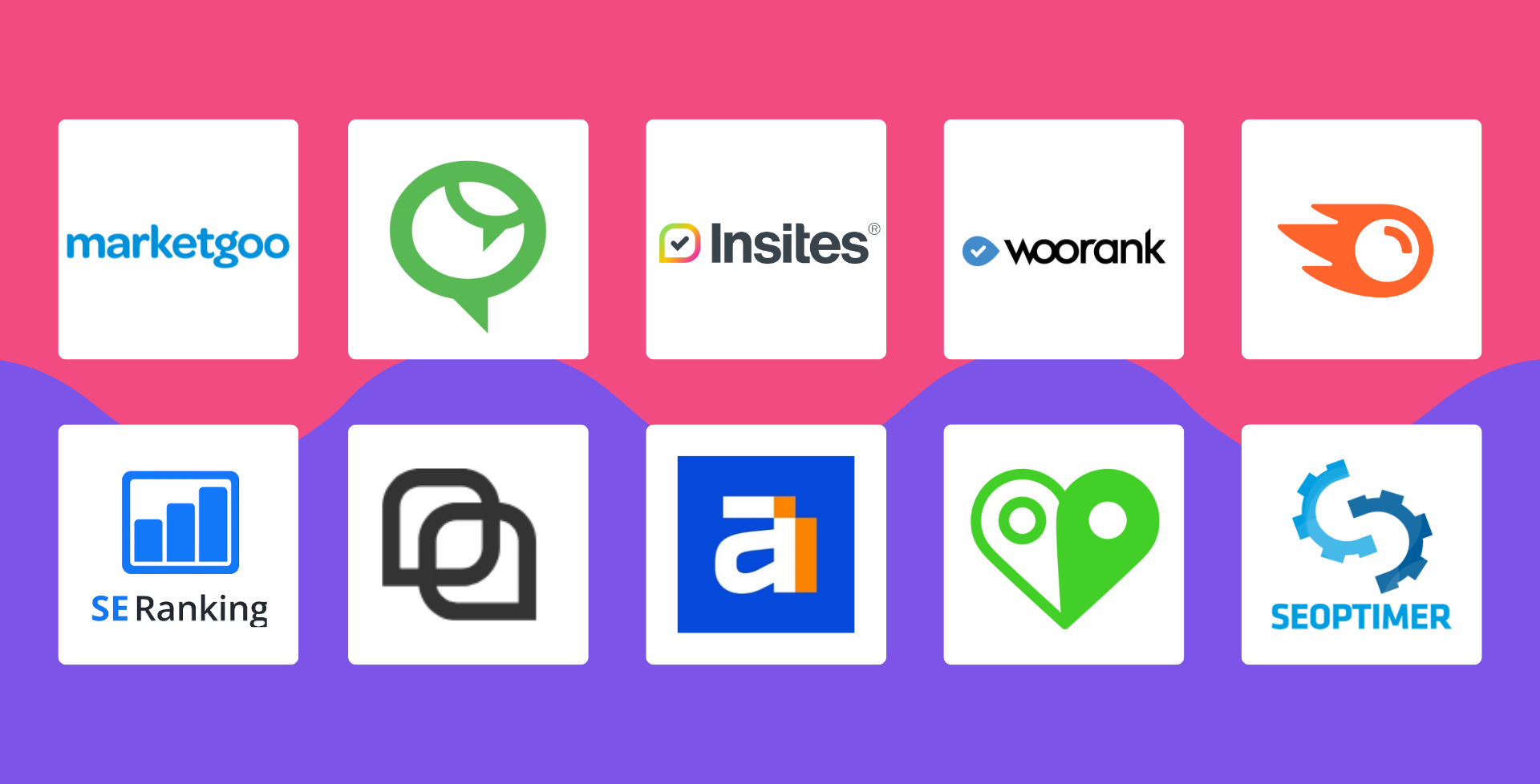Economic uncertainty is creating new opportunities for digital marketing providers selling to SMBs
Izzy Fletcher • May 29, 2025
With economic uncertainty continuing to dominate headlines, your SMB clients are making tougher decisions about where to invest their marketing budgets. But recent data reveals some surprising trends that could change how your sales team approaches prospects in 2025.
The surprising reality of SMB spending in uncertain times
Despite economic challenges, nearly half (49%) of small businesses are planning to increase their marketing budgets in 2025, while 35% plan to keep the same budgets, and only 16% are planning to decrease their budgets.
This data challenges the assumption that SMBs cut marketing spend first during economic downturns. Instead, we're seeing a more nuanced picture where savvy small business owners are committed doubling down on strategies that drive results.
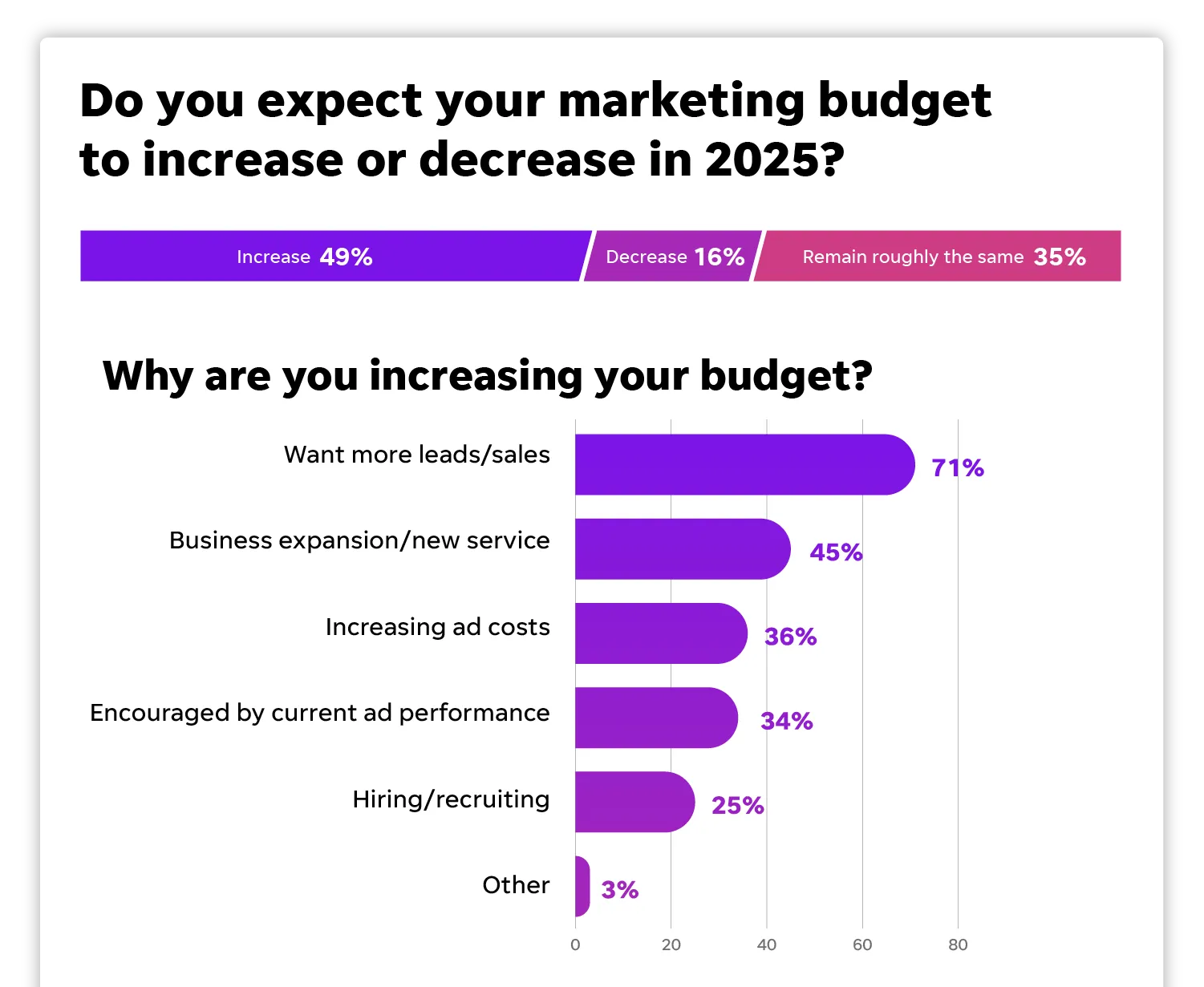
Where are SMBs planning to invest their digital marketing spend?
The majority of SMBs increasing their budgets are doing so to drive more leads and sales. This makes perfect sense when you consider that you can typically drive more leads by spending more, assuming you're getting a positive return on investment.
The data shows that SMBs are being strategic about their spending:
- Half of small businesses who are not currently using social media ads are planning to invest in them in the next 12 months and the most used platform is Facebook
- Nearly half (49%) are planning to do the same for search advertising
- 58% of small businesses leverage digital marketing to grow their brands
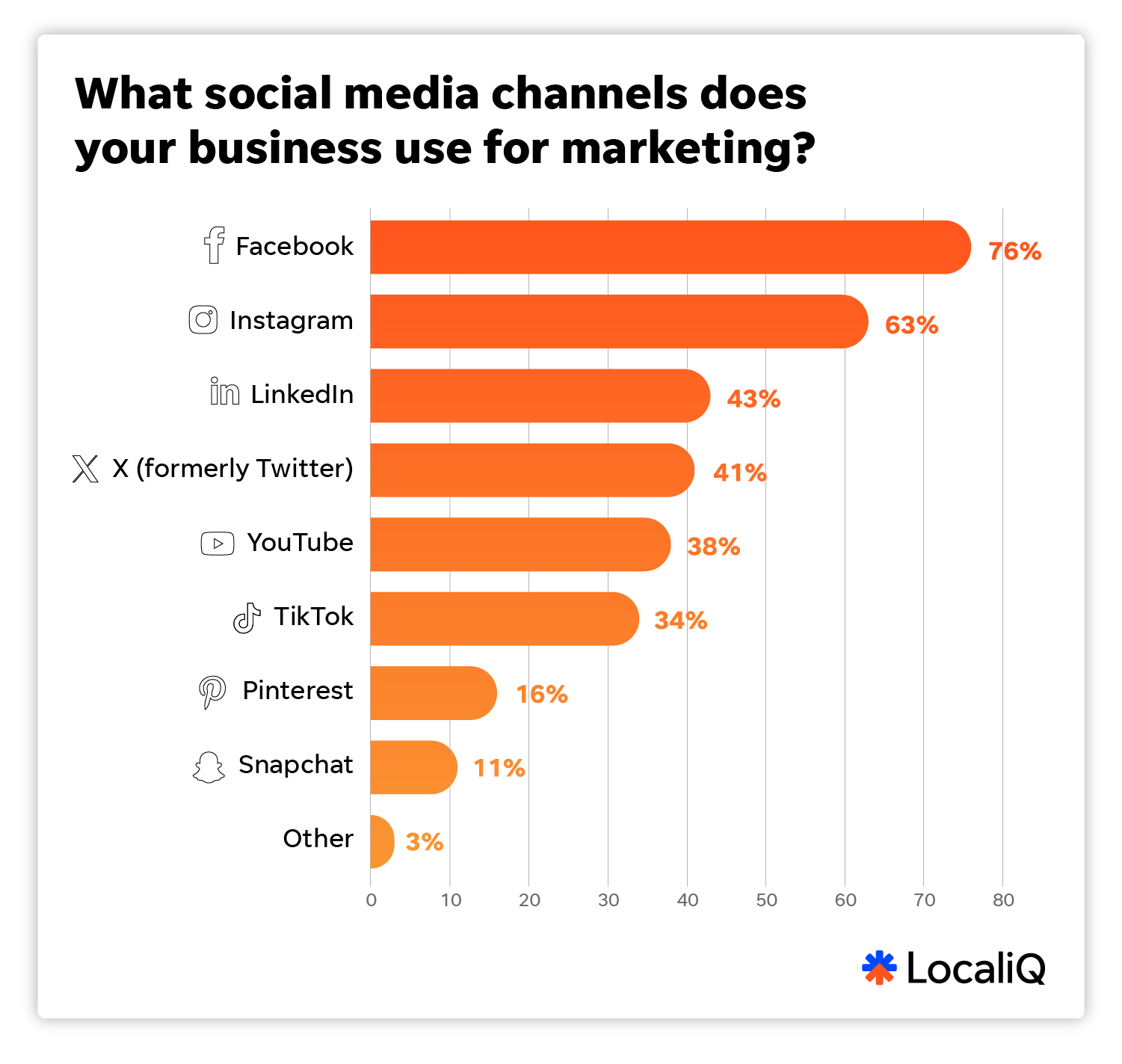
Where SMBs are prioritising their digital spend
The data reveals that SMBs aren't making blanket cuts across all marketing channels. Instead, they're being strategic about where they invest, increase, or reduce spending. The chart below by LocaliQ shows exactly where SMBs are planning to allocate their budgets in 2025:
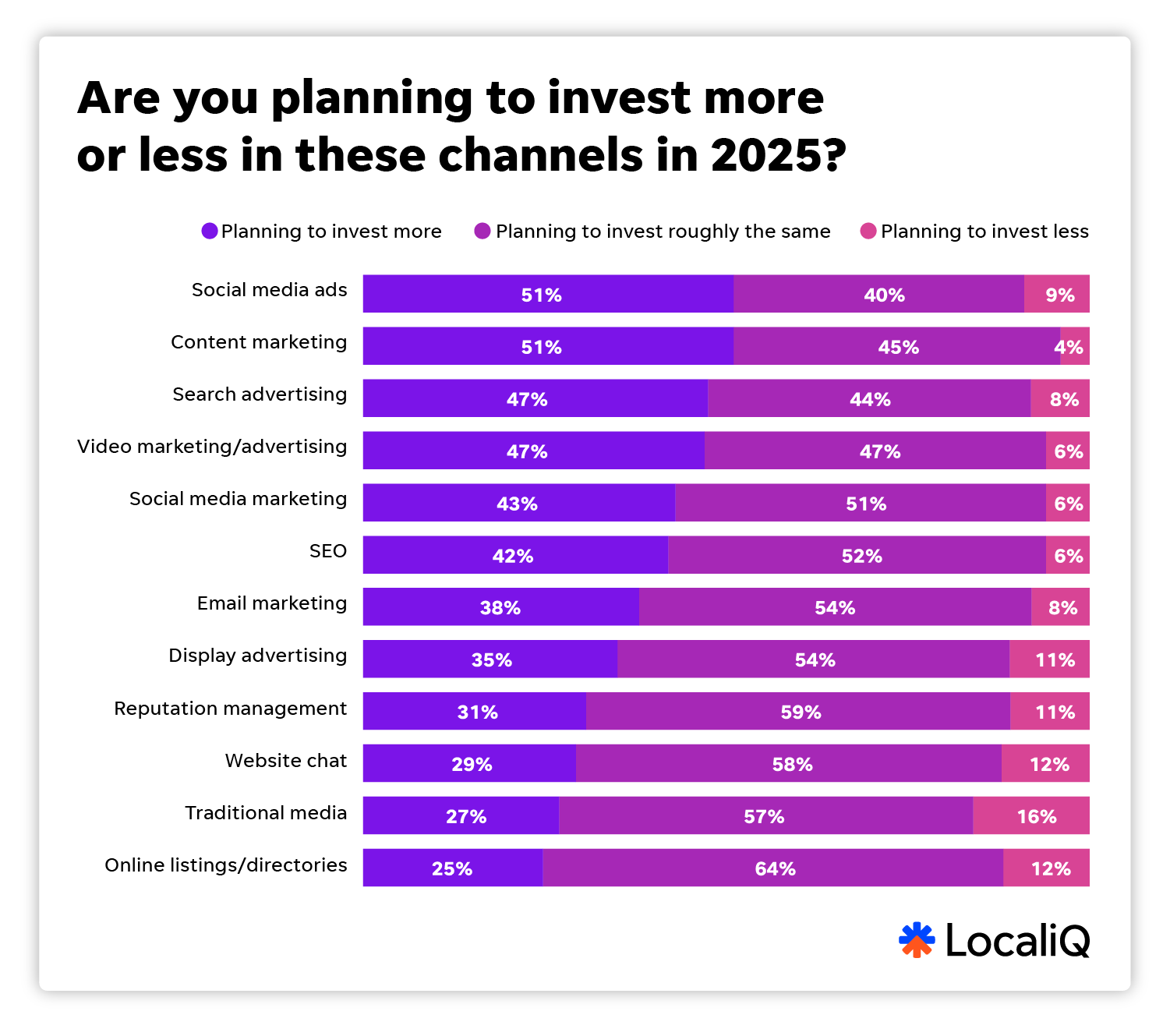
This data tells a compelling story about three distinct spending behaviours.
1. The growth-focused channels (top performers)
Social media ads (51% investing more) and content marketing (51% investing more) are leading the pack, with nearly half of all small to medium-sized businesses (SMBs) planning to increase their investment. Search advertising and video marketing aren't far behind at 47% each.
What this means for your sales team: These are the services SMBs are actively looking to expand. Lead conversations with social media advertising, content marketing, and search advertising opportunities. These prospects are ready to invest but need to see clear ROI projections.
2. The steady-state services (maintaining investment)
Services like SEO, email marketing, and social media marketing represent the cautious optimist segment. These businesses aren't cutting these services, but they're not expanding either.
What this means for your sales team: Focus on demonstrating value and efficiency improvements within existing budgets. These prospects want to know they're getting the most from their current investment, not necessarily spending more.
3. The declining investment areas (budget-conscious decisions)
Traditional media shows the highest percentage planning to invest less (16%), followed by online listings/directories (12%) and website chat (12%). Interestingly, even in these declining areas, the majority are maintaining current spending rather than cutting entirely.
What this means for your sales team: For prospects reducing spend in these areas, position your services as higher-ROI alternatives. Help them reallocate budget from traditional media to digital channels that show stronger performance.
The AI opportunity
According to Salesforce's report, 75% of SMBs are investing in AI, and 78% of SMB leaders believe it will be a game-changer for their businesses. But why are they so eager to adopt AI?
The answer lies in their biggest constraint: time. The majority (53%) of SMBs spend only 1-10 hours per week on marketing, yet they need to compete with larger businesses that have dedicated marketing teams.
This creates a massive opportunity for agencies that can offer AI-powered solutions that save time while improving results. SMBs aren't just buying AI for the sake of technology – they're buying back their time.
The data supports this: businesses with higher marketing budgets spend less time on marketing each week, likely because they're investing in time-saving tools or outsourcing to marketing partners. Your AI-powered services can provide that same efficiency to smaller businesses.
What your sales team should focus on
Based on this spending data, here are the key areas your sales team should emphasise when prospecting:
1. ROI-focused messaging
SMBs want to see clear connections between spend and results. Use data from your audit tools to show specific opportunities and expected outcomes.
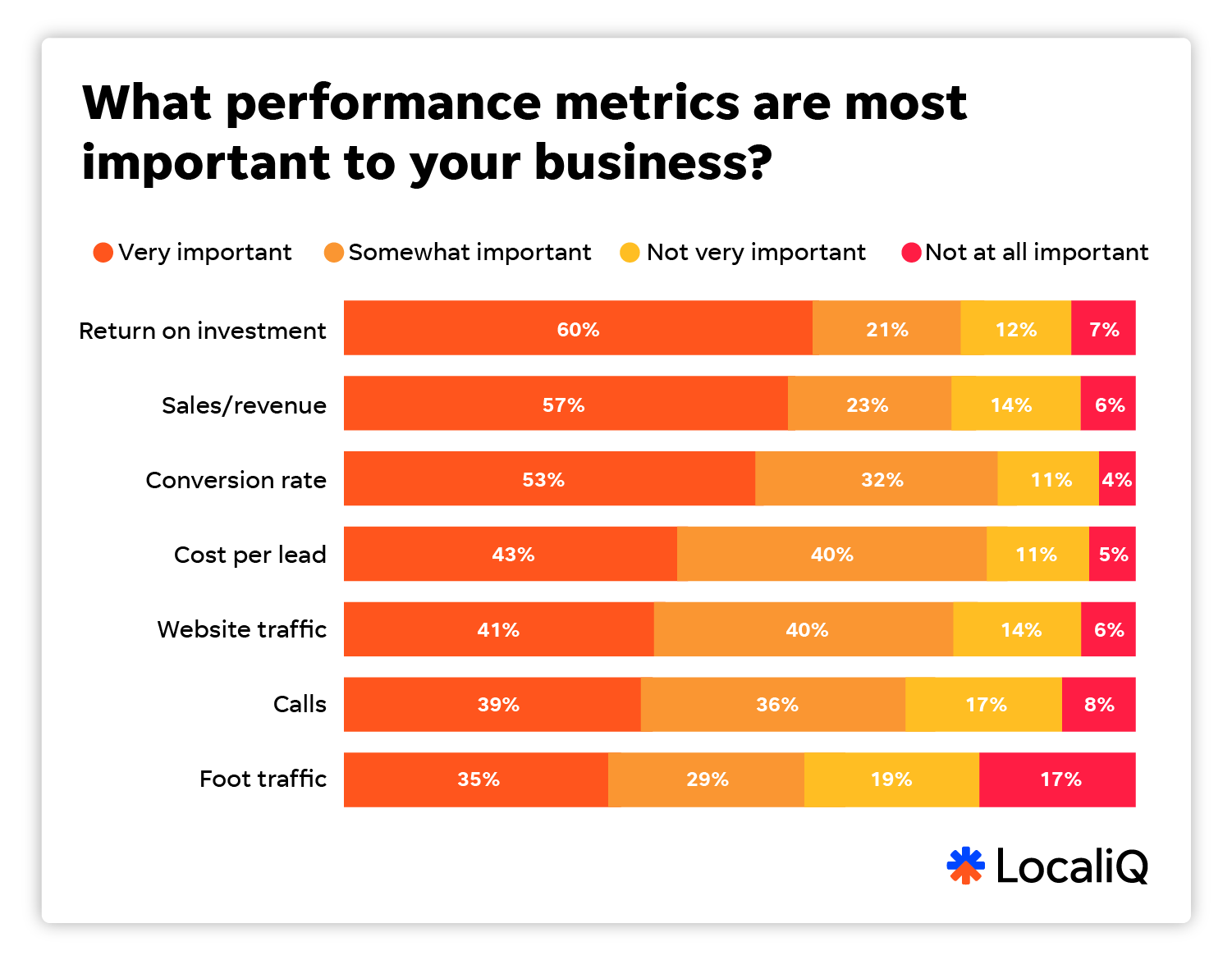
2. Time-saving solutions
Position your services as a way to free up the 1-10 hours per week SMBs currently spend on marketing. This is especially powerful for smaller businesses with limited staff.
3. AI-powered efficiency
Highlight how your tools and processes use AI to deliver better results. This positions you as forward-thinking and helps justify investment.
4. Local market expertise
46% of all Google searches are for a local product or service, and 28% of local searches result in a purchase within 24 hours. Local marketing is a clear winner for SMBs, let them know it!
Adapting your sales approach for different spending segments
For growth-focused prospects (49% of SMBs)
These businesses see opportunity where others see uncertainty. They're ready to invest more because they understand that economic downturns often create the best conditions for gaining market share.
Lead with expansion opportunities:
- Start conversations by identifying gaps in their current digital presence that competitors aren't addressing
- Use competitor analysis data from your audits to show exactly where they can leapfrog the competition
- Present market expansion scenarios: "While your competitors are pulling back on local SEO, investing £2,000 monthly could help you dominate the top 3 positions for high-value keywords in your area"
- Show them how to scale successful campaigns across multiple locations or service areas
Show how additional investment can capture market share:
- Demonstrate the relationship between increased spend and market visibility using real data
- Create "what if" scenarios showing potential market share gains when competitors reduce spending
- Use local grid analysis to show ranking opportunities that become available when competitors scale back
Provide detailed ROI calculations and scaling scenarios:
- Build comprehensive financial models showing investment returns over 6, 12, and 24 months
- Show the compound effect of early investment: "Investing now while competition is lower means lower acquisition costs and faster market penetration"
For cautious optimists (35% of SMBs)
This segment wants to maintain their position without taking unnecessary risks. They're open to new solutions but need to see clear improvements to their existing performance.
Focus on optimisation and efficiency:
- Begin with a comprehensive audit of their current marketing performance to identify inefficiencies
- Show them exactly where their current budget is being wasted and how to redirect it for better results
- Demonstrate how better targeting can reduce cost per acquisition while maintaining lead volume
Show how to get more from existing budgets:
- Provide budget reallocation recommendations based on performance data
- Demonstrate how automation and AI can reduce manual work while improving results
- Offer budget optimisation workshops where you analyse their current spend allocation in real-time
Demonstrate quick wins and measurable improvements:
- Identify 3-5 immediate improvements that can be implemented within 30 days
- Set up dashboards that clearly show before-and-after performance
- Offer pilot programs: "Let's improve your Google Ads performance over the next 60 days. If we don't hit our targets, we'll refund the difference"
For budget-conscious prospects (16% of SMBs)
These businesses are feeling the economic pressure but still need to maintain their digital presence. They require creative solutions that deliver maximum impact for minimal investment.
Offer scaled-down packages:
- Create "essentials" packages focusing on the highest-impact services only
- Offer "starter" packages with clear upgrade paths as their situation improves
- Focus on services that don't require ongoing monthly spend (one-time optimisations, website improvements)
- Create packages specifically designed for businesses with £500-£1,000 monthly budgets
Focus on high-impact, low-cost solutions:
- Prioritise local SEO improvements that can be done once but provide ongoing benefits
- Emphasise Google Business Profile optimisation and local listings management
- Focus on conversion rate optimisation for their existing traffic
- Recommend social media strategies that rely more on organic content than paid advertising
- Suggest email marketing campaigns using their existing customer database
- Identify quick technical fixes that can improve search rankings without ongoing costs
Provide flexible payment terms or phased implementations:
- Offer quarterly or bi-annual payment options to ease cash flow pressure
- Create phased implementation plans: "Start with local SEO foundation in month 1, add social media management in month 3 when budget allows"
- Offer seasonal payment schedules aligned with their business cash flow patterns
The bottom line
So don’t panic… Economic uncertainty isn't stopping SMBs from investing in digital marketing – it's making them more strategic about how they spend. Nearly half are increasing budgets, and even those maintaining current levels are open to solutions that prove their worth.
Your sales team's success in 2025 will depend on understanding these spending behaviours and adapting your approach accordingly. Use data-driven insights to demonstrate value, focus on time-saving solutions, and position your services as the smart choice for SMBs navigating uncertain times.
Ready to turn these insights into results? Discover how Insites can help your sales team identify the right opportunities and create compelling, data-driven proposals that SMBs can't ignore. Our comprehensive audit tools provide the insights you need to demonstrate clear value and win more deals, regardless of economic conditions.
Book a discovery call to see how industry-leading agencies are using data to close more SMB clients in 2025.








